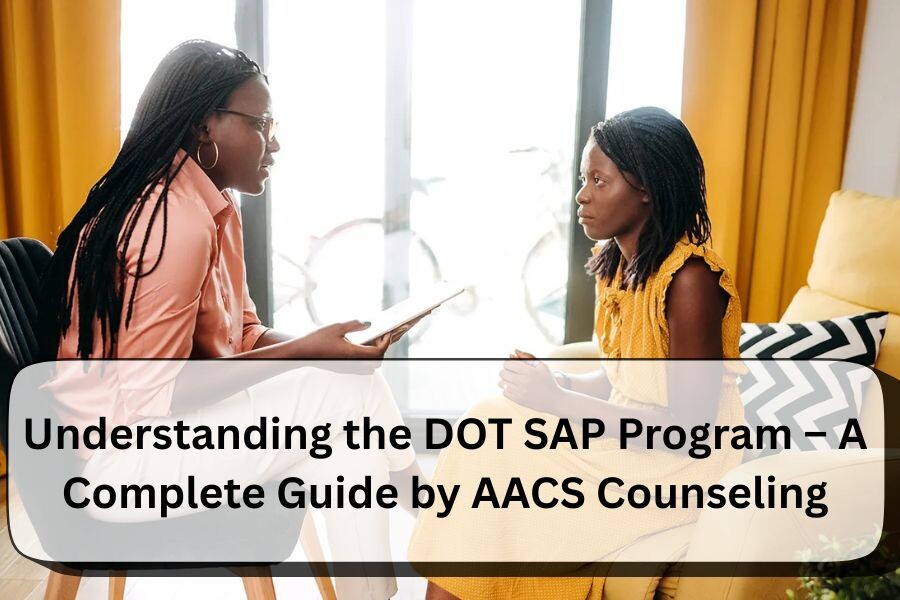When you’re facing a violation under the Federal Motor Carrier Safety Administration (FMCSA) or another Department of Transportation (DOT) agency’s drug & alcohol program, you must complete a SAP (Substance Abuse Professional) evaluation. One of the most common questions is: “What documents do you need for a DOT SAP evaluation in 2025?” Getting your paperwork ready ahead of time can save you delays, avoid extra sessions, and help you return to duty faster.
What Is a DOT SAP Evaluation? (Brief Overview)
Before diving into the document checklist, it helps to understand what a SAP evaluation is. A SAP is a certified professional under 49 CFR Part 40 who evaluates safety-sensitive employees after a failed or refused DOT drug or alcohol test. The evaluation leads to treatment or education recommendations, followed by follow-up evaluation and a return-to-duty test.
With changes in 2025, the process is tighter and documentation is more important than ever.
Why Documentation Matters for the SAP Evaluation
Accurate, complete documentation helps your SAP conduct an effective assessment, makes the return-to-duty process smoother, and ensures your employer stays compliant with DOT regulations. Per § 40.311 of Part 40, the SAP’s written report must include employee name/ID, employer name/address, reason for evaluation (violation date), date and format of assessment, and SAP signature & contact. Missing or incomplete documents can lead to delays, extra evaluations, or even rejection of your return-to-duty status.
Document Checklist: What You Need for a DOT SAP Evaluation in 2025
Here is a detailed checklist of documents to gather before your initial SAP evaluation. Adjust based on your specific situation (CDL driver, pipeline worker, transit, etc.).
1. Employer/Violation Documents
- A copy of the notification of the failed or refused drug/alcohol test (including date, specimen ID if provided).
- Employer’s letter of referral or note referencing the violation under DOT safety-sensitive duty.
- Your employer’s name, address and your job title — needed for the SAP report.
- If switching employers after the violation: a copy of your new employer’s details (name, address) if the evaluation will include a new employer. FMCSA
2. Personal Identification Documents
- Government-issued photo ID (driver’s licence, passport, etc.).
- Your employee ID number or last four of SSN (the SAP report may use SSN or employee ID).
- Contact details (address, phone, email) so the SAP can send required reports to your employer and to you (if required).
3. Medical/Substance Use History Documents
- Any prior substance abuse assessments, counselling or treatment certificates you have (even non-DOT) — helps the SAP see your history.
- Any medical records relevant to substance or alcohol use (for example, physician notes, hospital discharge summaries).
- If you’re under ongoing treatment or have mental-health history, bring documentation (dates, providers). Some 2025-updates emphasise screening for mental-health.
4. Job/Work History & Safety-Sensitive Duty Info
- List of your safety-sensitive duties (CDL driving, pipeline operation, transit, etc.), when you last performed them, when you ceased after violation.
- If your duties changed after the violation, bring documentation of that change.
- Any prior DOT violations (dates, circumstances) — the SAP will ask for this.
5. **Return-to-Duty Plan & Follow-Up Documentation (if applicable)
If you’ve already started treatment or education, bring:
- Certificates of completion of education or counselling modules.
- Evidence of attendance (dates, provider name) for recommended education/treatment.
- Previous SAP evaluation report (if switching SAPs or a follow-up).
- Documentation of passed return-to-duty test (if applicable) or schedule for it.
6. Other Supporting Documents
- Any written communications between you and your employer or SAP about the process (emails/letters).
- Proof of booking or completion of assessments (appointment confirmations).
- Authorization/release form if treatment provider records are to be shared with SAP.
- Receipts or financial documentation if cost/payment is relevant (may be useful).
How to Organize Your Documents for the SAP Appointment
- Create a labelled folder (physical or digital) called “DOT SAP Docs 2025”.
- Sort documents under tabs such as: Violation & Employer, ID & Personal, Medical/Substance History, Job History, Treatment/Education, Other Supporting.
- Scan and save digital copies (PDFs) so you can email or share if required. Many SAPs, especially virtual ones, will accept uploaded files.
- Bring the originals or certified copies to the appointment, and keep a secure personal backup.
- At the appointment, check with your SAP: “Do you have everything? Is anything else required before we can proceed?” This helps avoid delays.
What Happens After You Submit the Documents? (Process Overview)
- Initial Evaluation – The SAP reviews your documents, takes a face-to-face (in-person or approved virtual) interview, assesses your substance use history, current status, and makes recommendations for education/treatment.
- Treatment/Education – Based on the recommendations, you complete required coursework, counselling, or programs.
- Follow-Up Evaluation – After treatment/education you meet the SAP again; the SAP determines if you’ve demonstrated successful compliance.
- Return-to-Duty Test – Employer must collect a negative drug/alcohol test under DOT rules.
- Follow-Up Testing Plan – SAP provides a testing plan (often 6 tests within 12 months) which the employer must implement.
- Reporting & Clearance – The SAP sends written reports on their letterhead containing required items (employee name/ID, employer, violation date, evaluation date, recommendation) to the employer.
- Employer Returns to Duty – Once all steps are complete, you may resume safety-sensitive duties, assuming no other barriers.
FAQ – What Documents Do You Need for a DOT SAP Evaluation in 2025
Q 1: Do I need to bring my drug test result?
Yes — you should have the notice or documentation of the failed or refused DOT drug/alcohol test (date and nature of violation). The SAP needs to know the exact violation.
Q 2: Can I use a virtual appointment and send documents electronically?
Yes — virtual (audio-visual) SAP evaluations are accepted in 2025, provided the technology is secure and you can verify your identity. Some updates in 2025 tighten virtual protocols.
Q 3: What if I don’t have any previous treatment history or medical records?
That’s okay — the SAP will proceed with the evaluation. But bringing any available documentation (even non‐DOT counselling) helps create a more robust picture.
Q 4: Is the employer required to provide all documents?
No — employers are not required to pay for the SAP evaluation or treatment. But if they intend to return you to safety-sensitive duty, you must complete the SAP process.
Q 5: What happens if documents are missing or incomplete?
Missing documents may delay scheduling, require additional follow-up sessions and could delay your return to duty. Best practice: arrive prepared so the process stays on track.
Closing
Preparing the right documents ahead of time can significantly streamline your 49 CFR Part 40 SAP evaluation, reduce friction, and help you return to safety-sensitive duty without unnecessary delays. If you’re looking for a certified, knowledgeable SAP provider for your evaluation in 2025, we’re here to help at AACS Counseling.
Ready to get started? Contact us today and bring your documentation—and let’s move forward with the evaluation process.





![DOT SAP Program in Alabama: A Complete Guide [2025]](https://www.aacscounseling.com/wp-content/uploads/2025/11/Comprehensive-Insight-Alcohol-and-Drug-Evaluation-Questions-and-Duration-Explained-3.jpg)
![DOT SAP Program in Colorado: A Complete Guide [2025]](https://www.aacscounseling.com/wp-content/uploads/2025/11/Comprehensive-Insight-Alcohol-and-Drug-Evaluation-Questions-and-Duration-Explained-4.jpg)
![DOT SAP Program in Arizona: A Complete Guide [2025]](https://www.aacscounseling.com/wp-content/uploads/2025/11/Comprehensive-Insight-Alcohol-and-Drug-Evaluation-Questions-and-Duration-Explained-5.jpg)

![DOT SAP Program in New York: A Complete Guide [2025]](https://www.aacscounseling.com/wp-content/uploads/2025/11/Comprehensive-Insight-Alcohol-and-Drug-Evaluation-Questions-and-Duration-Explained-6.jpg)
![DOT SAP Program in California: A Complete Guide [2025]](https://www.aacscounseling.com/wp-content/uploads/2025/11/Comprehensive-Insight-Alcohol-and-Drug-Evaluation-Questions-and-Duration-Explained-7.jpg)